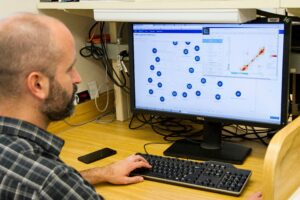
Plastics, renowned for their durability, pose a significant challenge due to their resistance to breakdown. Microplastics, the tiny remnants of these materials, continue to infiltrate soil, water, and air, posing threats to ecosystems and human health. Traditional recycling methods, while reprocessing plastics into new products, often degrade the material quality due to contamination and polymer degradation. Moreover, recycling efforts struggle to keep up with the escalating global plastic waste.
In a groundbreaking development, a research team led by the University of Delaware has unveiled a novel catalyst that accelerates the conversion of plastic waste into liquid fuels more efficiently and with fewer unwanted byproducts than existing methods. This pioneering work, featured on the cover of the September 18 issue of Chem Catalysis, marks a significant step towards energy-efficient plastic upcycling, reducing pollution, and fostering sustainable fuel production.
“Instead of letting plastics pile up as waste, upcycling treats them like solid fuels that can be transformed into useful liquid fuels and chemicals, offering a faster, more efficient and environmentally friendly solution,” stated Dongxia Liu, the Robert K. Grasseli Professor of Chemical and Biomolecular Engineering at UD’s College of Engineering.
Revolutionizing Plastic Upcycling with Mesoporous MXenes
One promising upcycling technique is hydrogenolysis, which employs hydrogen gas and a catalyst to convert plastic polymers into liquid fuels suitable for transportation and industrial applications. However, traditional catalysts often fall short due to the difficulty bulky polymer molecules face in interacting with the catalyst’s active sites. To overcome this, the researchers innovatively transformed MXenes, a type of nanomaterial, into mesoporous MXenes, characterized by larger, more accessible pores not previously utilized for plastic upcycling.
“MXenes form two-dimensional layers, like the pages of a book. These stacked layers in the closed book make it difficult for molten plastic to move through easily, limiting contact with the catalyst,” explained Ali Kamali, a doctoral candidate in the Department of Chemical and Biomolecular Engineering. “To improve the design, we inserted silica pillars to open up the space between MXene layers, allowing the polymers and intermediate compounds that form during the reaction to flow more easily.”
Testing and Results: A New Benchmark for Efficiency
The team tested their mesoporous MXene-supported ruthenium catalyst with low-density polyethylene (LDPE), a common plastic used in shopping bags and films. In a small pressurized reactor, LDPE was combined with the catalyst and hydrogen gas, then heated to melt the plastic into a thick syrup.
The results were impressive. The catalyst achieved reaction rates nearly twice as fast as those previously reported for LDPE hydrogenolysis. It also demonstrated high selectivity, effectively producing liquid fuels while minimizing byproducts like methane, a potent greenhouse gas. The researchers attribute this selectivity to the stabilization of ruthenium nanoparticles within the mesoporous MXene layers.
“We were able to produce a material that not only speeds the conversion but also improves the quality of the fuel products. This advance highlights the potential of nanostructured mesoporous catalysts to enhance plastic upcycling,” Liu said.
Future Prospects and Industry Implications
Looking forward, the research team aims to refine the catalyst further and expand their library of MXene-based catalysts to accommodate various plastic types. They aspire to collaborate with industry partners to transform plastic waste from a liability into a valuable resource, converting it into fuels and chemicals that benefit both the environment and local economies.
Other contributors to the research from UD’s Department of Chemical and Biomolecular Engineering include postdoctoral researcher Song Luo, graduate students Akash Warty, Antara Bhowmick, and Brandon C. Vance, along with Dionisios G. Vlachos, the Unidel Dan Rich Chair in Energy Professor of Chemical and Biomolecular Engineering. The team also partnered with experts from the University of Maryland College Park, the U.S. Army Combat Capabilities Development Command Army Research Laboratory, the National Institute of Standards and Technology, and Oak Ridge National Laboratory. The project received support from the Center for Plastics Innovation, an Energy Frontier Research Center funded by the U.S. Department of Energy, Office of Science, Basic Energy Sciences under award number DE-SC0021166.
This development comes as global attention increasingly focuses on sustainable solutions to the plastic waste crisis. By advancing technologies that convert plastic waste into sustainable fuels, the research not only addresses environmental concerns but also opens new economic opportunities, paving the way for a more sustainable future.





